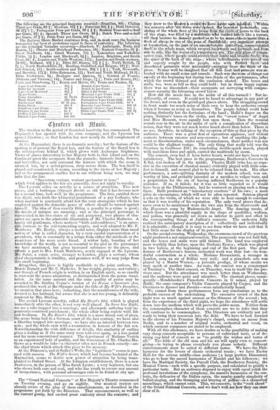4rntrrg nu/( 311ngir.
The reaction to the period of theatrical inactivity has commenced. The Haymarket has opened with its own company, and the Lyceum has opened likewise ; so that London has now nearly its full complement of theatres.
At the Haymarket, there is no dramatic novelty ; but the feature of the opening is at present the Royal box, and the feature of the Royal box is the retiring-room behind it, which glows with Arabesque brightness. Views of places interesting to her Majesty both in this island and on the Continent greet the occupants from the pannels ; fantastic birds, flowers, and butterflies, not only surround the mirrors with which the room is adorned, but, by a noveLiprocess, stray across them. The box itself is placed and constructed, it seems, according to the views of her Majesty ; and as the arrangement enables her to see without being seen, we may infer that the line "Spectatum veniunt, veniunt spectantur ut ipsfe," which Ovid applies to the fair sex generally, does not apply to royalty. The Lyceum relies on novelty as a source of attraction. Two new
pieces, and a burlesque (Olympic Devils) so old that it has become new for a second time, look well in the programme. The first, entitled Serve him Right, sets forth the whimsical punishment of a gay Lothario, who when married is constantly afraid lest the very stratagems which he has employed against the domestic peace of others should be turned against himself. The idea of thus exactly fitting a penalty to a crime is good ; the details of intrigue are amusing ; and as the principal personage is represented in his two states of sin and purgatory, two phases of cha- racter are open to the admirable illustration of Mr. Charles Mathews. A ttearty old gentleman, whose motto is "faith and confidence," is an agree-
able contrast to the self-tormenting sceptic, and well adapted to Mr. F.
Matthews. Mr. Roxby, always a useful actor, displays more than usual notion of what is called character, by a very careful representation of a greenhorn, who is constantly in a scrape from either the -misdeeds or the suspicions of his more acute friend. A widow lady, boasting of her knowledge of the world, is not so essential to the plot as the personages
• ;lee have mentioned, but gives increased substance to the piece, and ords a part to Mrs. Frank Matthews, newly engaged at the Lyceum.
- gr. Suter, a comic actor, stranger to London, plays a servant, whose ief characteristic is timidity, and promises well, if we may judge from Wis small beginning.
Altogether, this piece is highly creditable to the joint authors, Mr.
Morris Barnett and Mr. C. Mathews. It has weight, purpose, and variety; and though of French origin is written in an English spirit, so as exactly to represent the genus adaptation, as distinguished from the genus trans- lation. As the same amount and the same quality of praise may be awarded to Mr. Stirling Coyne's version of La Femme ti Quarante produced this week at the Olympic under the title of My Wife's Daughter, we mention that piece here ; remarking, that the sensitiveness of the wife, devoted to her husband, but aware that she is not too young, is delicately rendered by Mrs. Stirling. z The second Lyceum novelty, called My Heart's Idol, which is played immediately after the other, is not very well placed. In Serve him _Right, • e„--ave see a rake trapped into a marriage, and afterwards suffering very in- --44teiniously-contrived punishment ; the whole affair being replete with life 'rand freshness. In .Rfp Heart's Idol, which is a more dressy sort of piece, e scene being laid in a German court of the last century, we have also
it libertine trapped into marriage ; we have also an interval between two acts ; and the whole ends with a recantation in honour of the fair sex. Notwithstanding the wide difference of details, this similarity of outline gives a feeling as if the same story were told over again, in a less genial and far more conventional manner. The deportment of Madame Vestris as an experienced lady of quality, and the demeanour of Mr. Charles Ma- thews as a would-be rake—a character often met in French comedy—are the chief rivets which attach this piece to the memory. At the Princess's, and at Sadler's Wells, the " legitimate " course is pur-
sued with success. The Wife's Secret, which had become haeknied at the Haymarket, seems to derive new power of attraction by being trans- planted to Oxford Street. At the Islington establishment, there is a new Desdetnona, in the person of Miss Sarah Lyons ; a very beginner, but one who shows both care and zeal, and who has youth to excuse any amount of inexperience, with personal advantages rare to be found at any age.


























 Previous page
Previous page